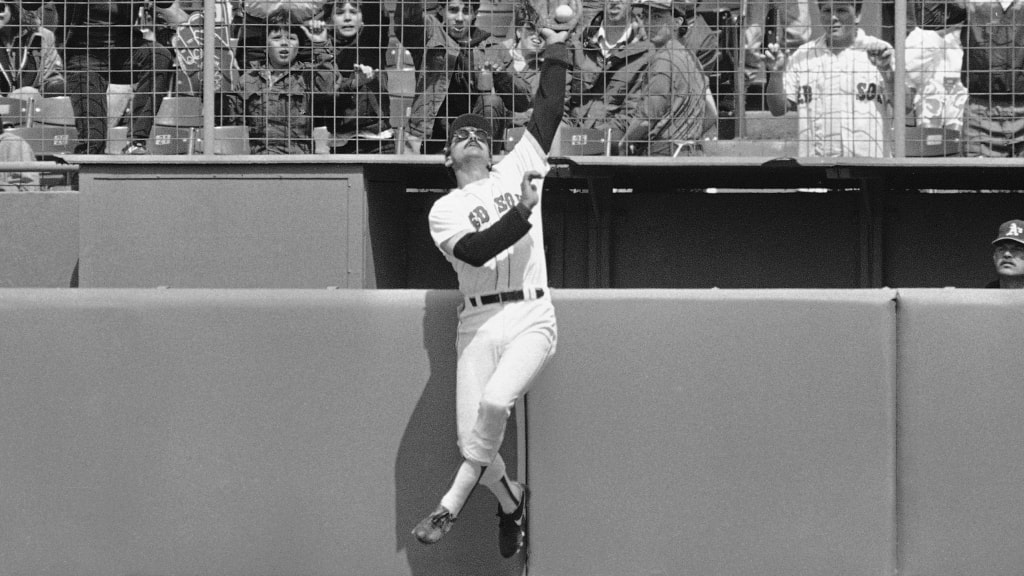
No one loves a good debate quite like baseball fans, and with that in mind, we asked each of our beat reporters to rank the top five players by position in the history of their franchise, based on their career while playing for that club. These rankings are for fun and debate purposes only … if you don’t agree with the order, participate in the Twitter poll to vote for your favorite at this position.
Here is Ian Browne’s ranking of the Top 5 right fielders in Red Sox history. Next week: Designated hitter.
1) Dwight Evans, 1972-90
Key fact: Won eight Gold Glove Awards, the most in Red Sox history
Dewey might have been a late bloomer on offense, but he was a defensive stud from the day he started with the Red Sox. Evans had a cannon arm that players would run on at their own risk. Though he didn’t have great footspeed, Evans instinctively knew how to position players in an era long before analytics. Particularly impressive was the way he patrolled Fenway Park’s challenging right field. The play he made to rob Joe Morgan and save Game 6 of the 1975 World Series is one of the most memorable catches in baseball history.
“He was always a great right fielder -- the best I’ve seen,” said Red Sox broadcaster Jerry Remy, who called Evans a teammate for seven years. “I’d have to put Mookie [Betts] in that category too. Dwight, in my era, was the best we ever saw in right field and I knew that from playing against him with the Angels, because the first thing in the scouting report would say, 'Don’t try to take the extra base on him.' Then I got to see it first hand when I was here. He was tremendous out there.”
Offensively, Evans essentially had two different careers. The first was from 1972-80, when he slashed .262/.344/.448 with 128 homers and 443 RBIs. The second one was from '81-90, when he was a force, putting together a line of .279/.385/.489 with 256 homers and 903 RBIs. This transformation didn’t just happen by itself. Evans worked and worked with hitting coach Walt Hriniak until finally clicking in midway through the ’80 season. From there, Evans never looked back. In fact, he hit the most homers of any American League player in the '80s with 256. He ranked second in the decade in RBIs (900) and walks (919), third in runs (956) and doubles (306) and seventh in on-base percentage (.385).
“He was always searching for a style [early in his career] and could never find it,” said Remy. “Hriniak got him into this one style of hitting that really turned his offensive career around to a point where now he’s being considered for the Hall of Fame.”
2) Mookie Betts, 2014-19
Key fact: His five three-homer games are most in club history
The way Betts was trending, he likely would have surpassed Evans as the best right fielder in team history. But the Red Sox, who feared Betts would leave as a free agent following the 2020 season, dealt him to the Dodgers on Feb. 10. That doesn’t take away from his tremendous volume of accomplishments in a short period of time. In 794 games for the Red Sox, Betts accumulated a 41.8 bWAR, second to Evans among right fielders in team history.
The case can be made that Betts is the best all-around player the Red Sox ever had. He could do it all -- serving as the definition of a five-tool player. Betts was at his electrifying best in 2018, when he won the AL Most Valuable Player Award on the strength of a .346 average and .640 slugging percentage. The Red Sox went on to win the World Series that season. Betts finished second in the AL MVP Award race in ’16. Betts scored 100-plus runs in his final four seasons with Boston. He did that while hitting 24 or more home runs each year and hitting .295 or higher in three of those four years.
Watching Betts play right field in Fenway Park was a thing of beauty. His gifted athleticism and strong instincts made him the perfect fit to master the challenging dimensions out there. Betts won the Gold Glove Award in each of the past four seasons. Red Sox fans are going to miss the sense of possibilities that existed any time he was on the field.
3) Jackie Jensen, 1954-59, ‘61
Key fact: Won the AL MVP Award in 1958
Though the mid-1950s represents an uninspiring period of Red Sox history, Jensen was one of the exceptions. He was a two-way force who could take over games and also had some speed. In his first season with Boston in ’54, Jensen accumulated 25 homers, 117 RBIs and 22 stolen bases. He nearly duplicated the homer-RBI combo the next season (26, 116) and then led the league with 11 triples in ’56. In that MVP season of ’58, Jensen took it to another level, slashing .286/.396/.535 with 35 homers and 122 RBIs.
After a similar season in 1959, Jensen retired while at the top of his game due to a fear of flying. He did come back for one more season in ’61 and put up subpar numbers. At that point, the panic attacks he experienced at airports became unbearable enough that he retired for good at the age of 34.
4) Trot Nixon, 1998-2007
Key fact: Belted a walk-off homer in Game 3 of the 2003 AL Division Series against Oakland
Nixon loved to get his uniform dirty and his grit made him a fan favorite with Boston fans, who have always had an appreciation for blue-collar players. Perhaps Nixon’s hard-nosed style of play overshadowed what a strong offensive player he was. Playing in 982 games for the Red Sox, he had a sturdy .845 OPS.
Perhaps because he shared a lineup with David Ortiz, Manny Ramirez, Nomar Garciaparra and other established vets, Nixon’s 2003 season never got the recognition it deserved. In that year, he had an impressive line of .306/.396/.578 with 28 homers and 87 RBIs in 441 at-bats. His adjusted OPS+ of 148 ranks third in the AL for that year.
Perhaps due to his rugged style of play, Nixon started to wear down in the ensuing years and never matched his 2003 brilliance again. But he had several key moments for the Red Sox during the historic postseason of '04. On defense, Nixon wasn’t flashy, but he got the job done.
5) Tony Conigliaro, 1964-67, '69-70, ‘75
Key fact: At 19 years old, the Swampscott, Mass., native homered in his first Fenway at-bat
Tony C’s career started in storybook fashion -- the local boy bashing home runs for the team he always wanted to play for. But the dream turned into a nightmare on Aug. 18, 1967, when Conigliaro was beaned by Jack Hamilton. Not only did that fateful moment keep Conigliaro out of the magical ’67 pennant race and World Series, but he had eye issues for the rest of his career.
In his first four seasons leading up to the beaning, Conigliaro belted 104 homers in 494 games and had an .849 OPS. After missing all of 1968, he came back strong to rip 20 homers for the Sox in ’69 and a career-high of 36 in ’70. But Conigliaro was dealt to the Angels after that ’70 season and was never the same player again. He would play just one year in California before making one final comeback for the ’75 Red Sox. It was short-lived, as Tony C hit two homers in 57 at-bats and was released in September.
Though known mostly for his bat, Conigliaro was also strong on defense. He led the AL in range factor in 1965 and finished second in that category in ’67. After his playing days, Conigliaro had several health complications and died in '90 at the age of 45.
Honorable mentions
Buck Freeman was one of the first players in history to display power. In each of his first three seasons with the Red Sox (1901-03), he hit double-digits homers while notching 100-plus RBIs. He split time between first base and right field. … J.D. Drew had a hard time living up to his contract and fans were disgruntled with his injuries. But the left-handed hitter had the biggest hit for Boston in the 2007 championship run -- a grand slam in Game 6 of the AL Championship Series. Drew had an .824 OPS in five years with the Sox. … Earl Webb hit 67 doubles -- yes, 67 -- for the '31 Red Sox. That club record will likely never be broken. Garciaparra came closest with 56 in 2002. … Shane Victorino was able to stay healthy for just the first of his three seasons with Boston, but he made it count. Victorino was a driving force in the regular season and postseason on offense and defense for the 2013 team that won it all.


